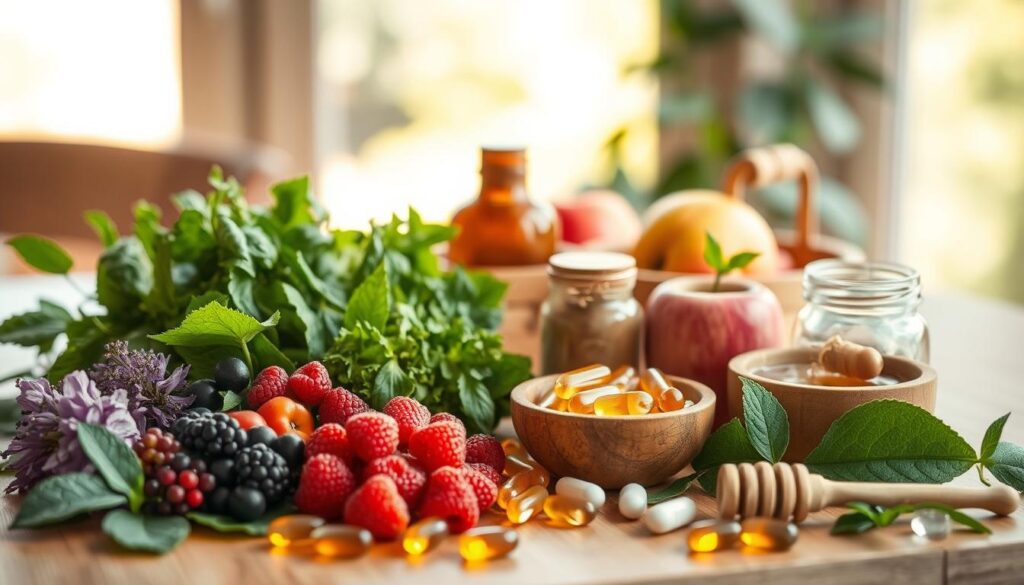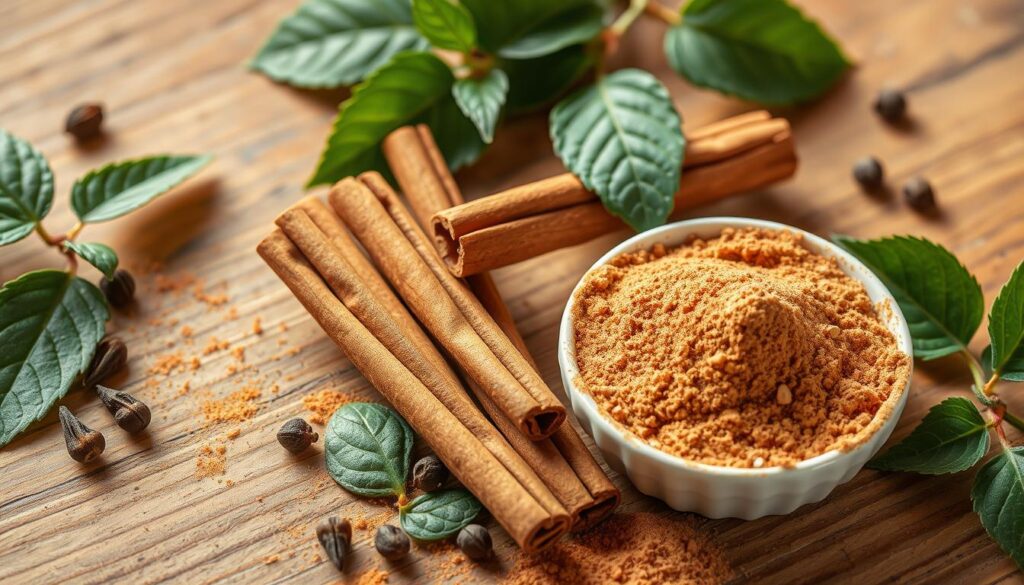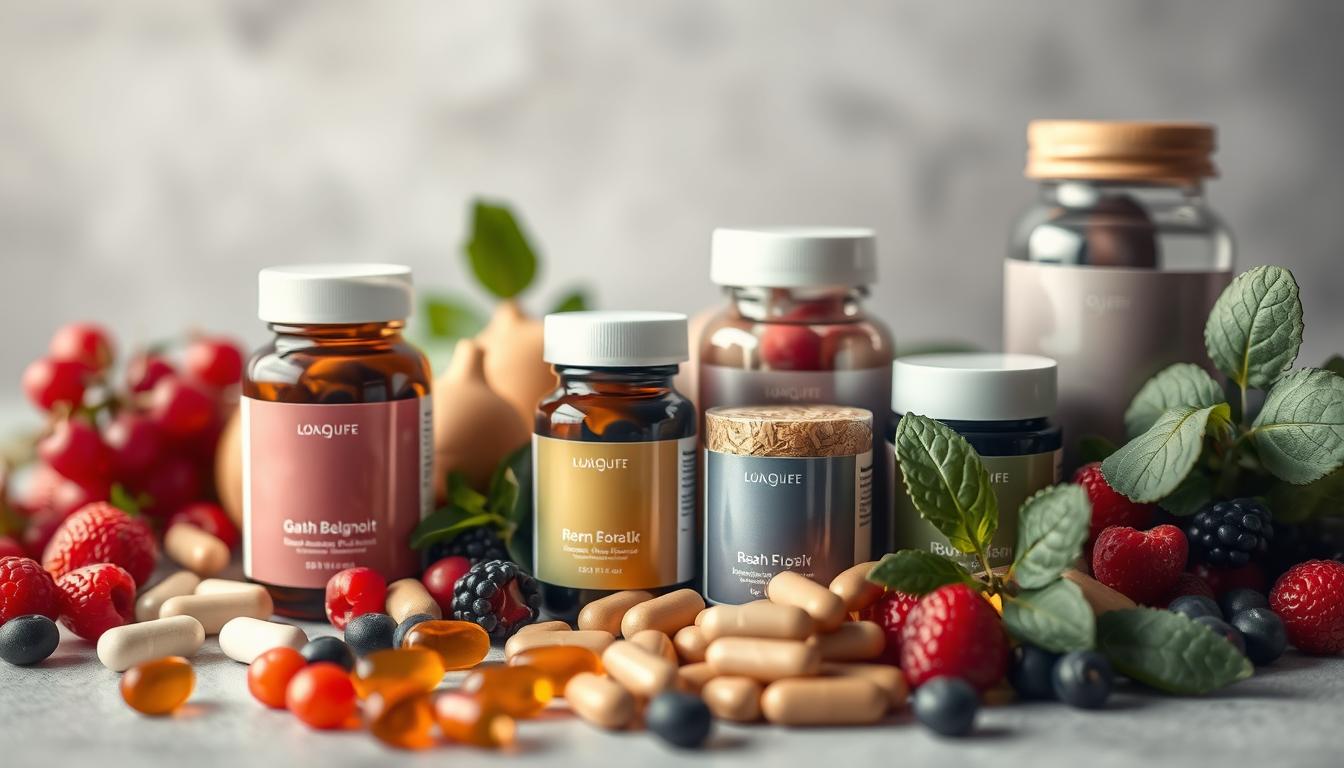Blood Sugar Supplements: Natural Support for Health
Standing in the health food store, I felt overwhelmed by the blood sugar supplements. My grandmother’s battle with diabetes came to mind. I wanted to find natural ways to help her and myself manage blood sugar.
Blood sugar supplements are becoming popular for natural health support. They include herbs, vitamins, and minerals. These products may help control blood sugar levels for people with diabetes.
Studies have shown that some supplements can be beneficial. For example, vitamin D may lower the risk of diabetes in adults with prediabetes by 15%1. In a three-year study, 22.7% of those with prediabetes who took vitamin D developed diabetes. This is compared to 25% who took a placebo1.
It’s important to remember that supplements are not as strictly regulated as medicines. The quality can differ a lot between products. Always talk to a healthcare provider before adding any new supplement, especially if you have diabetes.
Key Takeaways
- Blood sugar supplements offer natural support for metabolic health
- Vitamin D shows promise in reducing diabetes risk for prediabetics
- Supplements include herbs, vitamins, and minerals with anti-glycemic effects
- Product quality can vary due to less stringent regulation
- Consult a healthcare provider before starting any new supplement regimen
Understanding Blood Sugar and Its Impact on Health
Blood sugar control is key to our health. I’ll look into how insulin works, the dangers of uncontrolled blood sugar, and how lifestyle affects our glucose levels.
The Role of Insulin in Blood Sugar Regulation
Insulin is vital for managing blood glucose. It helps cells take in glucose from the blood, keeping sugar levels stable. For those with diabetes, it’s crucial to keep blood sugar between 80 to 130 mg/dL before meals and under 180 mg/dL two hours after2. Insulin resistance can upset this balance, causing blood sugar to rise.
Learn More on How to Take Control of High Blood Sugar Levels.
Risks Associated with Uncontrolled Blood Sugar
High blood sugar can cause serious problems. Symptoms include thirst, fatigue, headaches, and blurred vision2. Low blood sugar, or hypoglycemia, can happen when levels fall below 70 mg/dL, leading to shaking, sweating, and confusion2. Both conditions are risky if not managed.
Lifestyle Factors Affecting Blood Sugar Levels
Many lifestyle choices impact our blood sugar. Regular exercise, like 150 minutes of moderate activity a week, helps manage diabetes3. Daily activities like housework and gardening can also help control blood sugar3. Diet is also crucial, with foods high on the glycemic index causing quick blood sugar spikes. Using a metabolic health supplement can support healthy blood sugar, but always talk to a healthcare provider first.
Grasping how to manage blood sugar is vital for good health and avoiding diabetes complications. Regular checks, a balanced diet, and an active lifestyle are key to controlling blood sugar effectively.
Blood Sugar Supplements: An Overview

Blood sugar supplements may help manage glucose levels. They come in different forms, each focusing on blood sugar regulation.
Types of Blood Sugar Supplements
These supplements include herbal extracts, vitamins, minerals, and more. Cinnamon, a well-known herbal extract, has been shown to lower fasting blood sugar by 19.26 mg/dL4. Berberine, another effective supplement, when combined with lifestyle changes, can reduce fasting blood sugar by 15.5 mg/dl and A1C by 0.71% in type 2 diabetes patients5.
How Blood Sugar Supplements Work
These supplements work in different ways. Some, like alpha-glucosidase inhibitors, slow down carbohydrate digestion. Others improve insulin sensitivity or help cells take in more glucose. For example, gymnema sylvestre may reduce sugar absorption in the gut and increase cells’ sugar uptake from the blood5. Probiotics also help by reducing inflammation and protecting insulin-producing cells5.
Potential Benefits of Blood Sugar Supplements
Blood sugar supplements can offer several benefits. Aloe vera supplements have been reported to decrease fasting blood sugar by 46.6 mg/dl and A1C by 1.05% in type 2 diabetes patients5. Vitamin D supplements have also shown improvements in fasting blood sugar and A1C levels5. However, the American Diabetes Association notes that supplements are not proven effective for lowering blood glucose6.
| Supplement | Potential Benefit |
|---|---|
| Cinnamon | Reduces fasting blood sugar |
| Berberine | Lowers fasting blood sugar and A1C |
| Aloe Vera | Decreases fasting blood sugar and A1C |
| Vitamin D | Improves fasting blood sugar and A1C |
While these supplements show promise, it’s crucial to consult with your healthcare team before starting any new supplement regimen6. Some supplements may interact with diabetes medications or have adverse effects on blood glucose levels.
Learn More on How to Take Control of High Blood Sugar Levels.
Herbal Supplements for Blood Sugar Control

Herbal supplements are getting attention for managing blood sugar naturally. Research is still ongoing, but some herbs might help control glucose levels. Let’s look at a few herbs that could be beneficial.
Cinnamon is a well-known spice that might help lower blood sugar. A 2019 study found it could be effective7. Another study in 2016 suggested it could also improve fasting plasma glucose or hemoglobin A1c8.
Berberine, found in several plants, is also being studied for its blood sugar benefits. It’s not as widely researched as some herbs, but it’s gaining attention in diabetes management.
Nigella sativa, or black seed, has shown positive effects on blood sugar in studies. It has a long history in traditional medicine and is now being looked at for modern diabetes care.
Bitter melon is another herb worth mentioning. A 2020 study found that bitter melon extract could lower fasting blood glucose levels after 12 weeks8. This makes it a potential natural diabetes management tool.
Green tea, full of antioxidants, might also help with blood sugar control. Studies suggest its main antioxidant, EGCG, could improve glucose management and insulin activity7.
Even though these herbal supplements seem promising, it’s important to remember that the FDA doesn’t regulate them. This lack of regulation can cause problems with product quality8. Always talk to a healthcare professional before trying any new supplement.
Learn More on How to Take Control of High Blood Sugar Levels.
Vitamins and Minerals for Glycemic Support

Certain vitamins and minerals are key for managing blood sugar. As someone interested in diabetic support supplements, I’ve looked into their benefits. They can help manage blood sugar levels.
Magnesium: A Key Player in Insulin Function
Magnesium helps with insulin secretion and activity. A 2021 study in Nutrients found that magnesium can improve blood sugar and insulin sensitivity. This makes magnesium a good choice for insulin resistance.
Vitamin D and Its Role in Glucose Metabolism
Vitamin D can help control blood sugar, especially in those who are deficient. A 2023 study in BMC Endocrine Disorders found that Vitamin D lowers fasting blood sugar and HbA1c levels. It’s beneficial for those with type 2 diabetes and Vitamin D deficiency.
Zinc: Supporting Natural Insulin Production
Zinc aids in natural insulin production and secretion. Research shows a link between higher zinc levels and lower HbA1c levels. This suggests zinc’s potential as a pancreas support supplement.
Chromium: Enhancing Insulin Effectiveness
Chromium may make insulin more effective and improve glucose tolerance. A 2020 study in Pharmacological Research found chromium lowers fasting blood sugar and HbA1c levels. It’s beneficial for people with type 2 diabetes.
These nutrients offer promising support for managing blood sugar. The International Diabetes Federation’s Diabetes Atlas 10th Edition highlights the global diabetes problem. It shows the need for a comprehensive approach to diabetes care9.
Conclusion: Integrating Blood Sugar Supplements into a Healthy Lifestyle
Blood sugar control supplements can help manage diabetes. But they are most effective as part of a full health plan. This plan should include a balanced diet, regular exercise, and good sleep habits10.
For those with diabetes, keeping a food diary for a week can offer insights into eating patterns. Planning meals ahead and prepping food on weekends saves time and promotes healthier choices. Quick, nutritious options like wholegrain bread with peanut butter or oats with berries make great breakfasts11.
Studies show low carb diets may improve blood sugar control in the short term. A plant-based diet can also lead to significant weight loss. Eating low-glycemic index foods and fish twice weekly are good strategies for diabetes management supplement plans12.
Before starting any diabetes management supplement, I always suggest talking to a doctor. This is key for those with health issues or on medications. Remember, supplements support, not replace, standard diabetes care. Regular blood sugar checks remain crucial when using these products.
Learn More on How to Take Control of High Blood Sugar Levels.
FAQ
What are blood sugar supplements?
How do blood sugar supplements work?
What are some potential benefits of blood sugar supplements?
What are some popular herbal supplements for blood sugar control?
Which vitamins and minerals are important for glucose metabolism?
Should blood sugar supplements replace conventional diabetes treatments?
Are there any precautions when taking blood sugar supplements?
Source Links
- Can Supplements Help Lower Blood Sugar? – https://www.aarp.org/health/drugs-supplements/info-2023/can-supplements-lower-blood-sugar.html
- Blood Sugar | Blood Glucose | Diabetes | MedlinePlus – https://medlineplus.gov/bloodglucose.html
- Diabetes management: How lifestyle, daily routine affect blood sugar – https://www.mayoclinic.org/diseases-conditions/diabetes/in-depth/diabetes-management/art-20047963
- VA.gov | Veterans Affairs – https://www.va.gov/WHOLEHEALTHLIBRARY/tools/supplements-to-lower-blood-sugar.asp
- 10 Supplements to Help Lower Blood Sugar – https://www.healthline.com/nutrition/blood-sugar-supplements
- Vitamins & Supplements for Diabetes – https://diabetes.org/food-nutrition/diabetes-vitamins-supplements
- Herbs and Supplements for Diabetes – https://www.healthline.com/health/type-2-diabetes/herbs-supplements
- Type 2 diabetes: Using herbs and supplements – https://www.medicalnewstoday.com/articles/317051
- Key Nutrients for Optimal Blood Glucose Control and Mental Health in Individuals with Diabetes: A Review of the Evidence – https://www.ncbi.nlm.nih.gov/pmc/articles/PMC10536295/
- Dietary Advice For Individuals with Diabetes – Endotext – https://www.ncbi.nlm.nih.gov/books/NBK279012/
- Your lifestyle, diabetes and food – https://www.diabetes.org.uk/guide-to-diabetes/enjoy-food/eating-with-diabetes/your-lifestyle-diabetes-and-food-
- Overview, Dietary Interventions, Physical Activity – https://emedicine.medscape.com/article/2049455-overview

